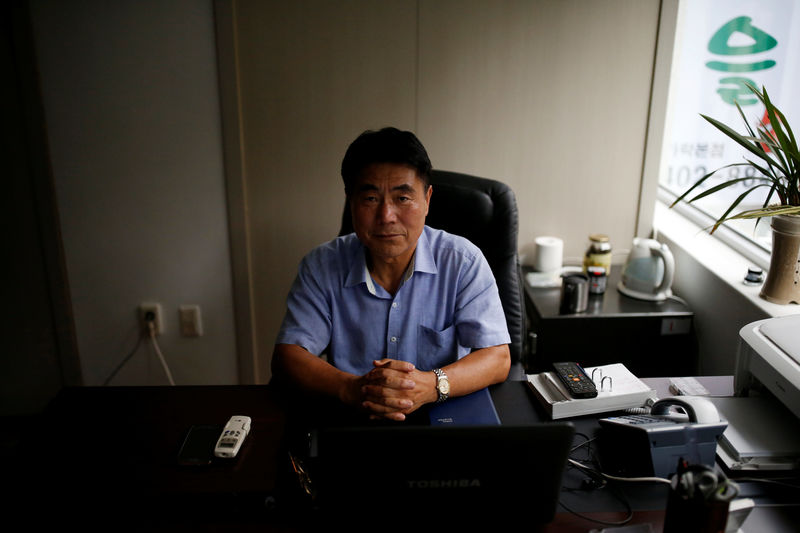By Ju-min Park and James Pearson (LON:PSON)
SEOUL (Reuters) - Thae Yong Ho, the most senior North Korean diplomat to flee to the South, is likely to have round-the-clock protection and make a comfortable living at a think-tank run by Seoul's intelligence service, say elite defectors who followed a similar path.
Thae, who was deputy ambassador at the North's embassy in London, defected with his family and arrived in the South, Seoul said late on Wednesday, an embarrassing blow for leader Kim Jong Un's increasingly isolated Pyongyang leadership.
Many of roughly 27,000 North Koreans who have fled the impoverished, repressive North for the wealthy and democratic South struggle to assimilate and are economically marginalized, but well-connected defectors like Thae are treated as a valuable resource who can shed light on a secretive neighbour.
Like many high-profile defectors, Kim Kwang-jin works for the Institute for National Security Strategy (INSS), a think-tank run by South Korea's spy agency, the National Intelligence Service (NIS).
"To live here, of course, everybody needs a job, and the South Korean government offers jobs to people. I was given the opportunity to work at INSS," said Kim, who defected with his family in 2003 while working in Singapore for a North Korean insurance firm that became notorious for involvement in scams.
Choi Ju-hwal was a colonel in the North Korean army when he fled to South Korea via Hong Kong during a business trip in China in 1995, making him the highest-level military defector at the time. He was an INSS researcher from 1997 to 2012 before leaving to head the Association of the North Korean Defectors.
"(The government) can't just pay him (Thae) for nothing, so it is most likely that he would be given a job at the research institute," said Choi, now 67, referring to the INSS.
The NIS declined to comment on Thae.
UNDERCOVER
Some defectors change their names for security purposes and to protect loved ones left behind, or to appear less obviously North Korean.
Most keep a low public profile, although some, like Kim, become prominent through media appearances as experts on North Korea.
While Thae had a relatively high public profile as a representative of North Korea in London, Choi expects the ex-diplomat to try to live anonymously in South Korea.
"He won't pursue a public life, because he has to think about the safety of his family he brought here. Being quiet can hurt people around him less, so I don't think he will do public activities," Choi said.
Choi said that for two years, he had four armed policemen guarding him around the clock due to concerns about his safety. He now has a lower level of police protection.
Kim, the former insurance worker, said he used to have one round-the-clock armed bodyguard.
ARDUOUS JOURNEY
Most ordinary defectors make a lengthy and often harrowing overland journey across North Korea's border with China to a third country before arriving by air in South Korea.
Upon arrival, they are held for up to 180 days alone in comfortable rooms, and screened to make sure that they are not spies or impostors.
After that, they are transferred to a resettlement complex, which they cannot leave, for another 12 weeks, to help them adjust to life in the South.
Many end up working in restaurants and other low-paid positions, earning 67 percent of the national average wage, data from the parliamentary budget office shows.
Once they finish their resettlement programme, each defector receives 20 million won ($18,025) to help find housing and jobs. Some use part of their subsidy to pay private brokers who facilitated their escape.
"Ordinary defectors are having difficulties in getting jobs and education and making families here," said Seo Jae-pyoung, a defector who left his homeland in 2001 and now works for Choi's group to support ordinary defectors in the South.
"It is not so easy for them as people say."
For higher-ranking defectors, the process can be different.
Kim said he was in South Korea, where he underwent interrogation, within 24 hours of walking into the South Korean embassy in Singapore. Choi was questioned alone at an intelligence agency safe house. The same could be true for Thae.
Overall, the number of North Korean defectors to the South has declined since leader Kim took power following his father's death in late 2011.
But in the first seven months of 2016 it rose by about 15 percent year-on-year to 814, including a group of 13 workers from a North Korean restaurant in Ningbo, China.
Experts say the share of well-connected defectors is rising, an increase that ex-insurance company official Kim said began when the 2013 execution of Kim Jong Un's powerful uncle, Jang Song Thaek, rattled Pyongyang's elite.
"In the past we couldn't have imagined that these kind of people are coming here - these kind of people from these kind of families," Kim said.

($1 = 1,109.5500 won)